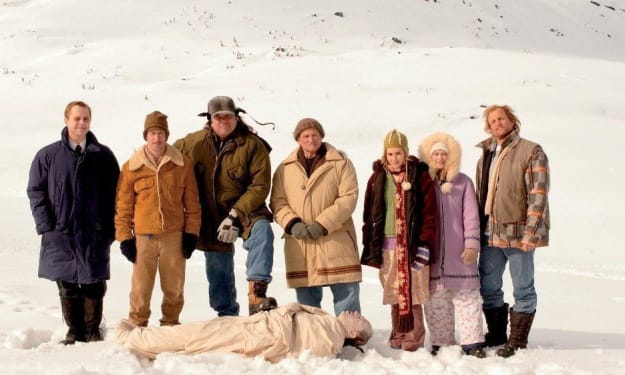
As we progress in our respective careers, it’s easy to feel dejected by the constant losses and small rejections throughout our working days. As a writer - from rejected manuscripts, to unread articles, the pressure to be seen can feel overwhelming.
Sometimes, to recharge, I like to take a step back and see what worked for others. To know that even the greats have felt swamped by their own failings at one point - and despite that, pushed on to create masterpieces.
This is one article in a series where I look at how to survive the trials of modern life as a writer - follow if you’d like to see my next installment on how to make yourself disappear.
1. Jack London
An early C20 American author, his novels Call of the Wild and White Fang became instant classics, focused on struggles for survival in a new American frontier. However, his success was hard-earnt. Born into poverty - his father deserting soon after his birth - London would leave school at age 14 in an attempt to make his own living. After withstanding Depression conditions, and being jailed for vagrancy, he would go on to teach himself a 4-year course at public libraries, joining the University of California in 1893. He then left after only one year, seeking to make a fortune from the Klondike Gold Rush. 12 months later, he returned, still broke.
Turning to writing, he found a handful of magazines that accepted his articles - and his output was ferocious. Throughout the 17 years of his writing career, he published 50 books of fiction and non-fiction, eventually becoming the highest-paid American author of his time.
2. Stephen King
Similar to London, King’s father walked out on the family when King was a kid. In his biography, King describes how this would torment his childhood self; for him, writing was a form of dealing with his childhood anxieties.
Whilst King was studying at the University of Maine, his goal was a career in teaching. After graduating in 1970, he initially failed to find a role as a teacher, instead working full-time at a laundromat, and writing in his spare time. In the same timeframe, he married and had two children.
In the 3 years between graduating, and the publication of his first novel Carrie, King describes the pressure as searing, almost unbearable, as if:
“...Battery cables were hooked up to your head. Like your brain was a battery.”
Struggling with a trifecta of kids, financial hardship and hard drug abuse, King credits his wife as the key element to Carrie’s creation: it was Tabitha who rescued unfinished pages from the bin and encouraged him to continue; and it was Tabitha who confronted King about his crippling drug addiction in the 80s. Having pushed through the immense pressure of that first step - into published authorship - King’s batteries have not run low, as he continues to churn out novels at an incredible rate.
3. Agatha Christie
Unlike some of the others on this list, Christie was born into a wealthy family. Though this offered her a higher standard of education and living, she nonetheless faced incredible difficulty getting her work published.
Even under a pseudonym, her first slew of articles were rejected by all magazines she applied for in 1910. When these articles flopped, she began work on her first novel, Snow Upon the Desert, drawing upon her recent family trip to Cairo. All six publishers she contacted rejected her work.
Pitying her, her family contacted the family friend, neighbour and successful novelist Eden Philpotts. Philpotts’ literary agent also declined Snow Upon the Desert.
In 1916, she finished her first detective novel, The Mysterious Affair at Styles. Though her original manuscript was rejected by both Methuen and Hodder & Stoughton, it was finally accepted - after sitting on a dusty desk for several months - and published in 1920.
Though that would be the final time she’d struggle getting her work published, it took almost a full decade for Christie to become a published writer, facing constant rejection for almost all of her initial ideas.
4. JK Rowling
Rowling - no matter your opinion on her now - produced one of the most culturally-significant Young Adult series in our generation. She has spoken widely on her own experience of failure. In a 2008 Harvard address, she speaks how, in the 7 years after her own graduation:
An exceptionally short-lived marriage had imploded, and I was jobless, a lone parent, and as poor as it is possible to be in modern Britain... The fears that my parents had had for me, and that I had had for myself, had both come to pass, and by every usual standard, I was the biggest failure I knew.
Though this time in her life was painful and often dark - she admits that she did momentarily struggle with ideas of suicide - she explains how she derived power from her rock-bottom:
I was set free, because my greatest fear had been realised, and I was still alive, and I still had a daughter whom I adored, and I had an old typewriter and a big idea.
This failure became a springboard from which Rowling launched her success: she became singularly focused on finishing The Philosopher’s Stone. This manuscript would go on to be rejected dozens of times, before eventually being accepted by Bloomsbury.
Across centuries of writing, and every genre imaginable, writers have smacked their heads endlessly against the stone wall of success. Constant, relentless criticism and rejection is a fact of life for most writers (and if you’ve not experienced this yet - write more!).
The stumblings and learning curves of even the most cultural elite of authors has shown that failure is just a sign of growth. Perhaps the very fact that these writers pushed through regardless - was exactly the way in which they became such beacons of success.
To stop failing is to stop growing, but if you - like me - are going through a rough patch right now, you’re welcome to reach out, and I'd be happy to chat :)
About the Creator
Rk.ke
Follow the Omnishambles






Comments
There are no comments for this story
Be the first to respond and start the conversation.